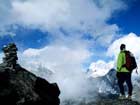| Videos | ? Latest |
|
? Feature | ? Sports | ? Your Videos |
Reacting to climate change: the recycler

Everyday Bhushan Tuladhar cycles over nine kilometres to work, as part of his personal response to climate change.
What Bhusan has been trying to do, is to show Kathmandu residents a different way of living. His, is a constant effort of trying to change the way people in Nepal think about climate change.
For the past 18 years, Bhushan has been cycling around the streets of Kathmandu, trying to find solutions to some of these problems.
He came up with a five point solution:
- Rain Water Harvesting
- Recycling Used Water
- A Bio-gas system
- Vermi Composting
- And Solar Energy
By converting his home into an example of renewed and recycled energy and bringing people to it he discovered he could make a small difference.
Bhushan's house, located on the outskirts of Kathmandu, is an example of how every Nepali can do something to react to climate change.
Water has become precious to Kathmandu after its regular sources started drying up due to changing rain patterns. Water demand in the Kathmandu valley is up to 240 million litres daily. But the supplies have stagnated at 90 Million litres a day, less than half the real demand. Bhushan believes water can be souced in other ways to the public supply and has turned his home into a recycle plant. Simple and inexpensive technology has been employed to set up rain-harvesting, used-water treatment and a urine separation toilet. For drinking water the family depends on the Solar Disinfectant method, he says has been approved by the WHO.
The house is spotted with objects made from recycled material.
Bhushan keeps worms as pets that live in his garbage bins. They consume the garbage and produce composte, which works as a fertilizer for his organic kitchen garden. The garbage is also a source of cooking gas, which is generated from less than two kgs of organic waste and it allows him to cook for about two hours. Bhushan also collects waste from his neighbours and relatives, to add to his bio-gas plant. Sometimes, he carries waste home, all the way from the city, where garbage is left in piles in its nooks and corners.
"Basically we don't have to sit here and worry what happened in Copenhagen or what Barack Obama does and so on. That's important what Obama does or what happens at some of these international summits but at the same time we don't have to sit here and say there is nothing I can do about it. Climate change is real, it's a real threat but we can do something about it in our homes, in our lives and if everybody does it we can make a big difference – thank you."
 0
0 






